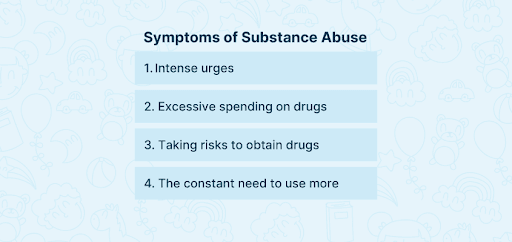Introduction
If you don’t want to get addicted to alcohol or any other substance, you should always avoid the first sip and curb the first desire. When a person is addicted to any sense, he is not the only one suffering; it becomes the suffering of the whole family. Addiction is a scary word, especially when our loved ones are involved, and it is one of the worst news ones can get that one of their loved ones has become the target of substance abuse. Starting as early as age 12, millions of people battle addiction and substance abuse.
What is Substance abuse?
People use alcohol, marijuana, pain pills, anxiety pills, methamphetamine, cocaine, opiates, hallucinogens, and inhalants as addiction. Excessive use of these drugs is called substance abuse. Substance abuse disorder addiction is a condition that impacts one’s brain and behaviour, making it difficult for people to manage their use of certain addictive drugs.[1] “substance abuse” refers to a drug or substance usage pattern resulting in serious issues or distress. It could involve skipping work or school or using drugs in risky conditions, like operating a motor vehicle. It could result in substance abuse-related legal issues or persistent substance use that harms friendships, family ties, or both. As a recognised medical brain illness, substance abuse relates to the abuse of illicit drugs.
Symptoms of Substance abuse
- The constant need to use more and more of a specific substance or combination of drugs to feel its influence and the urge to take the medication frequently to feel good are characteristics of substance abuse.
- Addiction symptoms include intense urges that interfere with thoughts,
- Excessive spending on drugs,
- Continued drug use despite problems,
- Taking risks to obtain drugs
- Experiencing withdrawal symptoms when stopping drug use,
- Taking risks to get drugs.
Characterization of Substance Abuse
- The frequency and amount of substance consumed,
- The pattern of substance use,
- The reasons for use,
- The impact on physical and mental health,
- The social and environmental factors influencing use,
- The presence or absence of substance use disorders.
- Factors such as age, gender, culture, and genetics may also play a role in the characterisation of substance use [3].
How does Substance Abuse affect?
Drugs are substances with physiological and psychological effects, and different meanings can have various products. Among the side effects of substance abuse are persistent and lifelong health issues. Substance abuse can cause side effects to people even after a very long time since they have left the habit. There is a link between a broad spectrum of short- and long-term health impacts of substance misuse. Substance abuse and dependence can have serious adverse effects and potentially affect practically all bodily organs. Side effects of substance abuse are:
- Compromised immune system- Substance abuse leaves people with a weak immune system, significantly increasing their chances of infection.
- Increased risk of heart conditions- Irregular pulse rate, heart attacks, collapsing veins, and blood vessel infections brought on by injectable drugs are just a few examples of cardiac diseases.
- Risk of Liver Damage- Increased stress on the liver puts a greater risk of severe liver damage or liver failure in the person with substance abuse.
- Increased transmission of infectious diseases: Drug injection causes HIV. Injection drug use spreads hepatitis C49. There is a link between endocarditis and cellulitis and injection drug.
- Increases risk of accidents- According to a report in 2016, over 12 million adults (16 and older) reported operating a vehicle while under the influence of marijuana or other illegal drugs. Using illicit drugs increases the chance of car accidents, much like driving after consuming alcohol. When a driver has consumed some substance, the risk of driving extends to themselves, their passengers, and other drivers on the road.
Read more about Substance Abuse and Sexual Disorder
How to Overcome Substance Abuse
Substance abuse is not a disease, it is a disorder,[2] yet treatment is available. Yes, it is indeed possible to control addiction. Through therapy, people can reclaim control over their lives and combat addiction’s negative consequences on their brains and behaviour. So one joins AA meetings, has sponsors, takes medications, and joins treatments.Despite many other options, behavioural therapy is one of the most important strategies for controlling substance addiction. In drug addiction therapy, patients are better equipped to deal with stressful circumstances and triggers that could result in relapse.
Read more about the Substance Abuse Treatment Center
Conclusion
The place in which one resides significantly influences one’s lifestyle, decisions, and preferences. For instance, compared to kids who aren’t exposed to drug or alcohol addiction at home, those kids are more likely to start using drugs or alcohol themselves. Child neglect, peer pressure, trauma, and assuming substances aren’t wrong can be some of the reasons are some of the most common factors that lead to substance abuse. But that certainly does not mean it is their life’s end. Though the journey is challenging, one can cross this difficult path with determination and support. Seek support from our wellness and mental health experts team at United We Care.
References
- C. L. Rowe and H. A. Liddle, “Substance abuse,” J. Marital Fam. Ther., vol. 29, no. 1, pp. 97–120, 2003.
- “Drug addiction (substance use disorder),” Mayo Clinic, 04-Oct-2022. [Online]. Available: https://www.mayoclinic.org/diseases-conditions/drug-addiction/symptoms-causes/syc-20365112. [Accessed: 21-Mar-2023].
- “Substance abuse: Know the signs,” WebMD. [Online]. Available: https://www.webmd.com/mental-health/addiction/substance-abuse. [Accessed: 21-Mar-2023].
- “Find addiction treatment centres & helpline numbers in India,” Indianhelpline.com. [Online]. Available: https://indianhelpline.com/de-addiction-helpline. [Accessed: 21-Mar-2023].












